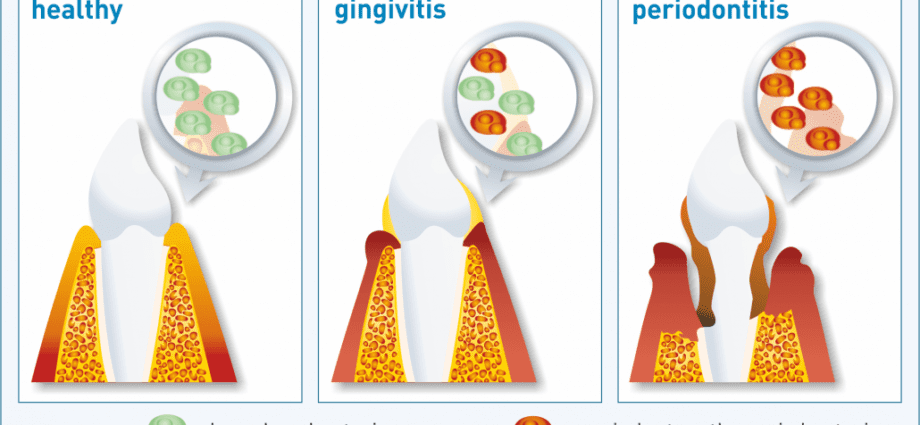Contents
The periodontitis
Periodontitis is an inflammation of the tissues that surround and support the teeth, called the “periodontium”. These tissues include the gum, supporting fibers called the periodontium, and the bone in which the teeth are anchored.
Periodontitis is a disease of bacterial origin, which most often occurs when the immune mechanisms are weakened.
Periodontitis usually begins with inflammation of the gum tissue (gingivitis) which gradually spreads to the bone tissue, forming infected “pockets” between the gum and the tooth.
Left untreated, periodontitis can lead to bone destruction and loosening or even loss of teeth.
Remark There are several forms of periodontitis and their classification has long been debated. The specialists preferentially speak of “periodontal diseases”, which include all the attacks of the periodontium. The most recent classification distinguishes gingivitis (more superficial) from periodontitis that affects the bone1. |
Types of periodontitis
Among periodontitis, we generally distinguish:
- chronic periodontitis, which has a slow to moderate rate of progression.
- aggressive periodontitis, which can be localized or generalized.
Periodontitis can also occur alongside diseases such as diabetes, cancer or HIV / AIDS infection, for example. Dentists then speak of periodontitis associated with general disease.
Another way to classify periodontitis is based on the age of onset of the disease. Thus, we can distinguish:
- adult periodontitis, which is by far the most frequent.
- early periodontitis in children and adolescents, which progresses rapidly.
Who is affected?
According to sources, periodontal disease is estimated to affect, to varying degrees, 20 to 50% of adults in most countries of the world2.
The World Health Organization (WHO) estimates, based on 80 studies in more than 30 countries, that 10 to 15% of adults suffer from severe periodontitis in the world.1.
A recent study in the United States confirms that almost half of adults have mild, moderate or severe periodontitis. The prevalence and severity of the disease increase with age. This same study points out that around 65% of people over 65 have moderate or severe periodontitis.3.
Aggressive periodontitis, which affects young people more, is rarer. It is estimated to affect 0,1 to 0,2% of the population in Europe, and up to 5 to 10% of North Americans of Hispanic or African descent.4.
Causes of the disease
Periodontitis is a disease of complex origin that involves two factors:
- oral bacteria, harmful or “pathogenic”.
- a weakened or unresponsive immune system, which allows these bacteria to gain ground and multiply.
Several factors can contribute to the appearance of periodontitis such as tobacco, infection, poor diet, etc.
Periodontitis can also be a manifestation associated with certain general illnesses, such as diabetes (see the section “people at risk and risk factors”).
Hundreds of different species of bacteria live in the mouth. Some are beneficial but others are harmful to oral health. These bacteria form a film on the gums and teeth, which is the plaque.
This dental plaque is removed when brushing your teeth, but it reform quickly and can solidify into tartar.
Within days, tartar can cause inflammation of the gums called gingivitis. Gradually, if the immune system does not react strongly enough, the balance between “good” and “bad” bacteria will be upset. Harmful bacteria like Porphyromonas gingivalis will take over and attack the gums, destroying the surrounding tissue. This is how periodontitis begins. Each form of periodontitis is associated with a different type of bacteria, which makes the study of these diseases quite complex.5.
Course and possible complications
Periodontitis occurs when gingivitis goes untreated and progresses. Left untreated, periodontitis can lead to tooth loss.
Chronic periodontitis in adults progresses slowly, over several years.
Aggressive periodontitis begins in adolescence or before the age of 30 and undergoes rapid progress.
In addition, chronic periodontitis is associated with prolonged inflammation, which has negative effects on the whole organism and which can increase the risk of cardiovascular diseases, among others.6.










